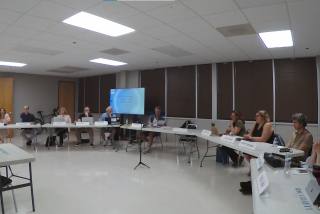Board Member May Be Sensing Age Discrimination
Question: At 80, I am the oldest member on the board of our Palm Springs-area complex.
During the last few years a younger generation has moved into this complex. I believe because of my age I am discounted by the other, much younger board members. The younger owners have a very different attitude toward money and the way things should be done.
The problem is that these board members are excluding me from the “real” meetings. Every time they call a meeting they go straight to a motion and a vote, and my presence and input are meaningless.
When I was elected, I promised the homeowners that I would represent their interests, but that is not happening. I believe the reason I am allowed on the board is because the other members thought I would go along with their “business as usual” tactics. This board doesn’t want homeowners to attend meetings, so they let the homeowners come in, mill around for a while and, after they leave, call the meeting to order.
I do not like or agree with what the other board members are doing and have tried to voice my concerns, but I am ignored. I must admit I am a bit afraid to speak up because of my age. I brought this to the attention of some other homeowners, who told me if I didn’t like it to get off the board or move out.
I’m not sure what is happening, but it doesn’t feel right. I feel like I am living in a surreal situation. Is there anything I can do about this?
Answer: It doesn’t feel right because it’s not right. The Davis-Stirling Act requires that meetings “of the membership of the association shall be conducted in accordance with a recognized system of parliamentary procedure or any parliamentary procedures the association may adopt.”
One such system, Robert’s Rules of Order, is one of the oldest guides on the subject and explains procedures for motions.
First the motion is made; then it is seconded, followed by discussion and voted on. Failure to follow procedure may not invalidate the motion, but it means the board is breaking the law, and it calls into question whether the board is legitimately interested in its fiduciary duties to all the homeowner-members of the homeowner association or the board members merely in serving their own interests.
The Open Meetings provision of the Davis-Stirling Act gives all homeowners the right to attend board meetings. If the board waits until the homeowners leave before calling the meeting to order, they are breaking that provision of the law as well.
Having been elected by the membership, the board is charged with managing the association.
Regardless of how unfair it may seem, ignoring or outvoting you is of no consequence to the conduct of meetings. Your age should play no part in the decision-making process.
The reaction from other homeowners, telling you to get off the board or move out, is cause for concern. This response indicates the growing difficulties of dealing with a board whose intention is to rule rather than govern.
Do not be discouraged. Continue voicing your opinions to the board and make certain your comments and votes are recorded in the minutes. Often, individual legal liability can be avoided if you show your “due diligence” by lodging an objection or discussion on the record and voting against a project when all others are in favor, or vice versa.
Should those who elected you find that this board does not respect their wishes, they may finally elect others to the board who will.
*
Stephen Glassman is a writer and an attorney in private practice specializing in corporate and business law. Donie Vanitzian, J.D., is a writer and arbitrator and manages commercial property. Both live in common interest developments and have served on various association boards. Mail questions to Common Interest Living, P.O. Box 451278, Los Angeles, CA 90045 or e-mail to [email protected].
More to Read
Sign up for Essential California
The most important California stories and recommendations in your inbox every morning.
You may occasionally receive promotional content from the Los Angeles Times.










